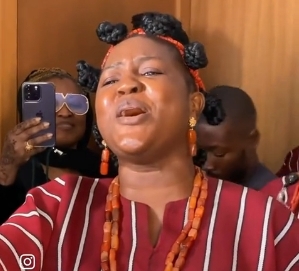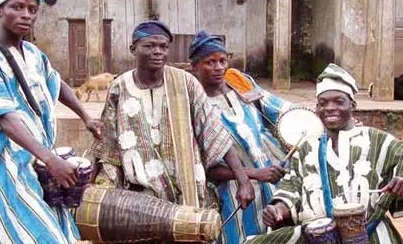
support@yorubalibrary.com
+2348073529208, 07038599574

Yoruba music is a rich aspect of Yoruba culture, deeply enlaced with the social and spiritual life of the Yoruba people. Among the key figures in Yoruba music are the praise singers, known as akewi, who play a vital role in preserving history, honoring individuals, and promoting cultural values. This article explores the significance of praise singers in Yoruba music.
Historical Background
Praise singing is an ancient tradition in Yoruba culture, with roots that stretch back centuries.
1. Origins: The tradition of praise singing can be traced back to the royal courts of ancient Yoruba kingdoms, where praise singers were employed to extol the virtues of kings and nobles.
2. Cultural Importance: Praise singers hold a prestigious position in Yoruba society, serving as custodians of oral history and cultural heritage.
The Role of Praise Singers
Praise singers perform several important functions within Yoruba culture.
1. Custodians of History: Praise singers preserve the history and genealogies of families and communities through their songs. They recount the achievements and virtues of ancestors, ensuring that these stories are not forgotten.
2. Honoring Individuals: Praise singers are often invited to events such as weddings, funerals, and festivals to honor individuals. Through their songs, they celebrate the accomplishments and qualities of the person being honored.
3. Promoting Social Values: Praise songs often include moral and ethical lessons, promoting values such as bravery, integrity, and respect. This helps reinforce societal norms and behaviors.
4. Spiritual Connection: In addition to honoring people, praise singers also invoke the presence and blessings of deities and ancestors, creating a spiritual connection through their music.
Techniques and Styles
Praise singers use various techniques and styles to deliver their messages effectively.
1. Oríkì: Oríkì are praise poems or chants that are rich in metaphors and allusions. They are crafted to highlight the unique qualities and achievements of individuals or deities.
2. Drumming and Instrumentation: Praise singing is often accompanied by traditional instruments such as the talking drum (dùndún), the bata drum, and the gángan. These instruments enhance the rhythm and emotional impact of the performance.
3. Call-and-Response: This interactive style involves the praise singer chanting a line, which is then echoed by the audience or a chorus. This creates a dynamic and engaging performance.
4. Improvisation: Skilled praise singers often improvise, tailoring their songs to the specific context and audience. This spontaneity adds a unique and personal touch to each performance.
Modern Adaptations
While the tradition of praise singing remains strong, it has also adapted to contemporary times.
1. Fusion with Modern Music: Praise singers are increasingly collaborating with contemporary musicians, blending traditional praise singing with modern genres such as Afrobeat and hip-hop.
2. Media and Technology: The use of media and technology has expanded the reach of praise singers. Recordings of praise songs are now available online, and performances are broadcast on television and radio.
3. Cultural Festivals: Praise singers play a prominent role in cultural festivals and events, both within Nigeria and in the diaspora, helping to promote Yoruba culture globally.
Conclusion
Praise singers are an integral part of Yoruba music, preserving history, honoring individuals, and promoting cultural values through their art. Their ability to adapt to modern times while maintaining traditional practices ensures that the rich heritage of Yoruba praise singing continues to thrive. As the Yoruba community evolves, praise singers remain a vital link between the past and the present, celebrating the enduring spirit of Yoruba culture.

The unique styles of Yoruba Bata and Dundun dances…

The emergence of new age social media and impact i…